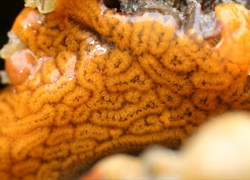Under invasion
There is a growing risk of alien invasion. Forget the tabloids sold at the supermarket checkout. Ignore the (endless) parade of programs on the higher cable channels. This is real, and this is now. Well, not quite now, but in a few months. When it warms up.
I happened across a documentary from the Magdalen Islands, dealing with the aquaculture industry. For them, the danger is small, green and slightly slimy. the tunicate. Let me quote from the DFO website, addressing the problem on my Island, as well as the “Iles”.
The mussel aquaculture industry in Prince Edward Island has been severely impacted by the introduction of four invasive tunicate species since 1998. Two solitary tunicates, the clubbed (Styela clava) and vase (Ciona intestinalis) tunicates, and two colonial tunicates, the violet (Botrylloides violaceus) and golden star (Botryllus schlosseri) tunicates, are challenging the sustainability and productivity of this vital industry. Initial efforts were directed toward controlling the spread of these tunicates. Recently, to ensure sustainability of the PEI mussel industry, efforts have been focused on mitigation measures to reduce the impact of tunicate infestation on mussel farms.
There; that should wake you up. Or, how about some pictures?



Pretty, until it devours you. Or your mussels! Seriously, we live in a world where creatures travel far from their original grounds, and when they find a new home without predators, things go awry. Right now, the lucrative mussel culture is under siege.
(Now to get back to my own world, where I suffered, briefly, from an uncontrolled indent tag .)


